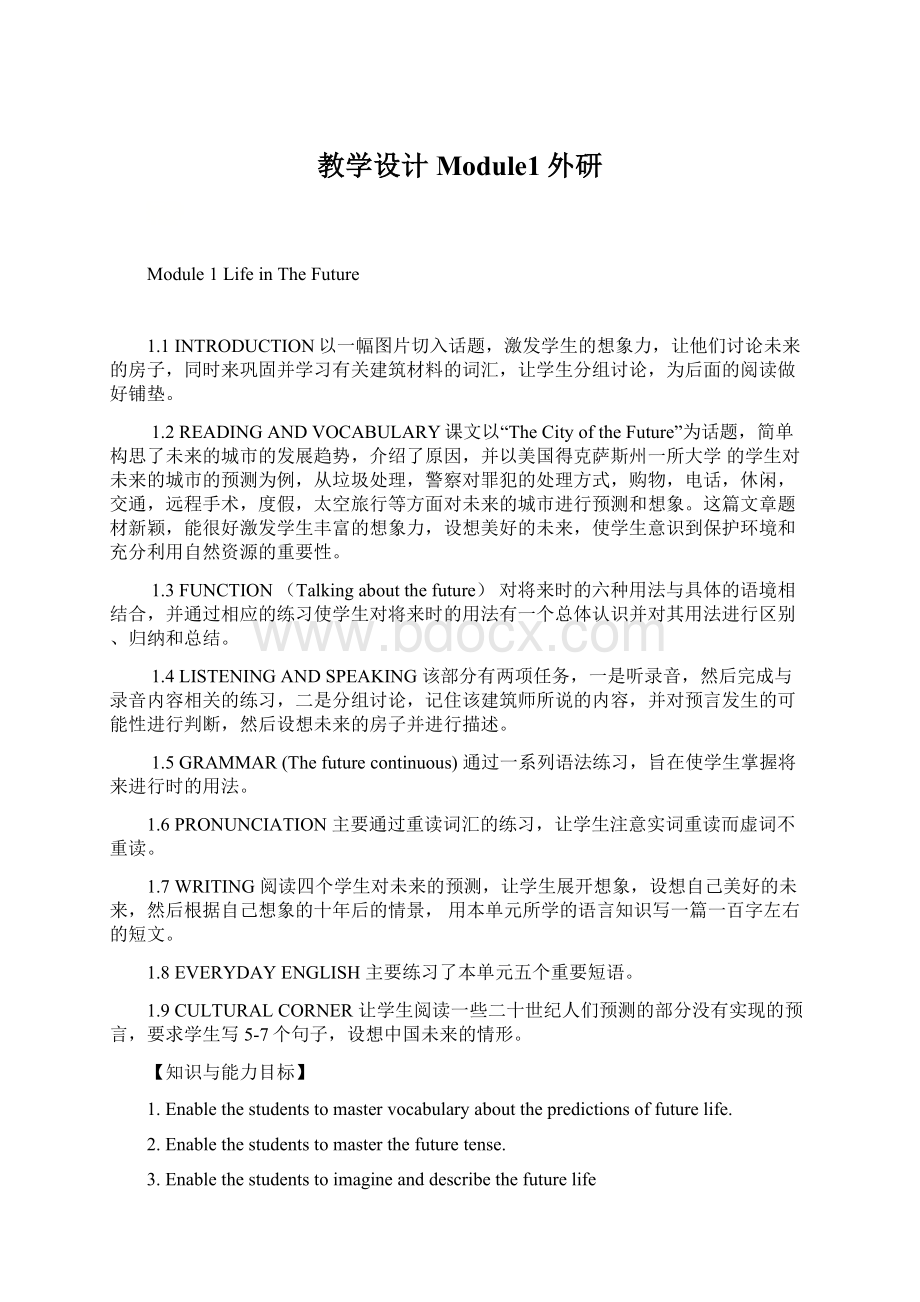教学设计Module1外研.docx
《教学设计Module1外研.docx》由会员分享,可在线阅读,更多相关《教学设计Module1外研.docx(12页珍藏版)》请在冰豆网上搜索。

教学设计Module1外研
Module1LifeinTheFuture
1.1INTRODUCTION以一幅图片切入话题,激发学生的想象力,让他们讨论未来的房子,同时来巩固并学习有关建筑材料的词汇,让学生分组讨论,为后面的阅读做好铺垫。
1.2READINGANDVOCABULARY课文以“TheCityoftheFuture”为话题,简单构思了未来的城市的发展趋势,介绍了原因,并以美国得克萨斯州一所大学的学生对未来的城市的预测为例,从垃圾处理,警察对罪犯的处理方式,购物,电话,休闲,交通,远程手术,度假,太空旅行等方面对未来的城市进行预测和想象。
这篇文章题材新颖,能很好激发学生丰富的想象力,设想美好的未来,使学生意识到保护环境和充分利用自然资源的重要性。
1.3FUNCTION(Talkingaboutthefuture)对将来时的六种用法与具体的语境相结合,并通过相应的练习使学生对将来时的用法有一个总体认识并对其用法进行区别、归纳和总结。
1.4LISTENINGANDSPEAKING该部分有两项任务,一是听录音,然后完成与录音内容相关的练习,二是分组讨论,记住该建筑师所说的内容,并对预言发生的可能性进行判断,然后设想未来的房子并进行描述。
1.5GRAMMAR(Thefuturecontinuous)通过一系列语法练习,旨在使学生掌握将来进行时的用法。
1.6PRONUNCIATION主要通过重读词汇的练习,让学生注意实词重读而虚词不重读。
1.7WRITING阅读四个学生对未来的预测,让学生展开想象,设想自己美好的未来,然后根据自己想象的十年后的情景,用本单元所学的语言知识写一篇一百字左右的短文。
1.8EVERYDAYENGLISH主要练习了本单元五个重要短语。
1.9CULTURALCORNER让学生阅读一些二十世纪人们预测的部分没有实现的预言,要求学生写5-7个句子,设想中国未来的情形。
【知识与能力目标】
1.Enablethestudentstomastervocabularyaboutthepredictionsoffuturelife.
2.Enablethestudentstomasterthefuturetense.
3.Enablethestudentstoimagineanddescribethefuturelife
4.Improvestudents’abilityoflistening,speaking,readingandwritingaboutpredictionstoacertaindegree.
【过程与方法目标】
Task-basedteachingmethod;pair-work;group-work;discussion;exercise
【情感态度价值观目标】
Cultivatestudents’positiveattitudetowardsthebetterlifeinthefutureandenvironmentalconsciousness.
【教学重点】
1.Enablethestudentstomastervocabularyaboutthepredictionsoffuturelife.
2.Enablethestudentstomasterthefuturetense
【教学难点】
3.Enablethestudentstoimagineanddescribethefuturelife
4.Improvestudents’abilityoflistening,speaking,readingandwritingaboutpredictionstoa
certaindegree.
各课时ppt及素材中的音频,图片及练习等
教学过程
Period1Introduction,ReadingandVocabulary
StepⅠIntroduction
1.Askstudentstolookatthepictureonpageoneandanswerthefollowingquestions.
Whatisit?
Wheredoyouthinkitis?
Wouldyouliketoliveinit?
Whatmaterialsitismadeof/from?
2.Namesomecommonmaterials
aluminium;wood;brickrubber;steel;mud
3.Askstudentstosaysomenaturalandman-madebuildingmaterials.
Naturalmaterials:
wood,mud,stone,grass....
Man-madematerials:
glass,steel,cement,rubber,plastic....
4.Showsomestructuresandaskstudentstosaywhattheyaremadeof.
5.Vocabularyexerciseaboutthematerials.
__________isaverylightmetal.
_____isaverystrongmetal.
Both______and_____comefromtrees.
______islight,strong,verypopular,andman-made.
______areoftenusedtobuildwalls.
________isverystrongandisusedinmanymodernbuildings.
_____iswetearth.
_____isanaturalhardmaterial.
_____isusedtomakewindows.
StepⅡReading
1.Listentothetapeofthepassageandchoosewhichtopicshavebeentalkedabout.
2.Skimming
Matchthemainideaofeachpart.
3.While-reading
WhathavestudentsinaTexasuniversitydone?
They’vethoughthowtorunacityin2025.
Wherewillgarbageshipsgo?
Tothesun.
Whowillbatmannetscatch?
Criminals.
.
Wherewon’tpeoplebeallowedtosmoke?
Withinacity’slimits.
Howwillpeoplegoshopping?
Online.
Whatnumberwillpeoplekeepforlife?
Theirtelephonenumber.
4.Matchthewordswiththeirmeanings.
clinicdisabilitymallonlineoutdoorsrecreation
runoutsolarsurgeryurbannet
1)aproblemwhichpreventsyoufromdoingsomething
2)notinabuilding
3)fromthesun
4)freetimeactivities,suchassportandentertainment
5)youcanseethistocatchalotoffishatthesametime.
6)throughtheInternet
7)aplacewhereyoucangetmedicaltreatment
8)todowithtownorcitylife
9)ashoppingcentre
10)touseuporfinishcompletely
11)medicaltreatmentinwhichthedoctorcutsopenyourbody
5.Post-reading
Completethefollowingchart.
5.Discussion
Imaginewhatourschoolwillbelike20yearsfromnow.Shareyourideawithyourpartner.Accordingtothediscussion,writeashortpassagenamedOurFutureSchool.
StepⅢSummaryandHomework
Makeasummaryaboutthetextandassignthehomework.
1.Readthetextfluentlyandpickoutthesentencesyouappreciate.
2.Rememberthewordsandphraseswelearnedhere.
3.Writeabouttheschoolofthefutureinabout60words.
Period2Listening,SpeakingandPronunciation
StepⅠListening
1.Pre-listening
Describeyourhometoyourpartner.Talkaboutthesethings.
sizeandnumberofrooms
furniture
technology
2.While-listening
2.Hethinkshousesinthefuturewillbedifferent_________.(b)
(a)outside(b)inside(c)outsideandinside
3.Houseswillhave_________whichmove.(c)
(a)floors(b)ceilings(c)walls
4.Themostimportantroomwillbethe_________.(b)
(a)bathroom(b)kitchen(c)livingroom
5.The_________willbebigger.(a)
(a)bathroom(b)diningroom(c)toilet
6.Thehousewillbecontrolledbya________.(a)
(a)computer(b)robot(c)telescreen
7.Ifmachinesare“smart”,theyare_______.(c)
clean(b)invisible(c)clever
8.Thearchitectis________optimisticabouttheeffectofthehouseontheenvironment.(c)
(a)notatall(b)notvery(c)very
3.Post-listening
Workinpairs.Trytorememberwhatthearchitectsaysabout:
1.whatcouldhappentothediningroomandthelivingroom
Theywilldisappear.
2.howtoswitchonthelights
Thecomputerwilldoit.
3.whatthetoiletwillbeabletodo
Itwillmovehigherorlowerdependingonwhousesit.
4.whatthedishwasherwillbeabletodo
Itwillwashthedisheswithoutwater.
StepⅡSpeaking
1.Speaking-Pairwork
Saywhichthingsyouthinkwillhappen,andwhichwon'thappen.
2.Speaking-individualwork
Describethehousetotherestoftheclass.
StepⅢPronunciation
1.Underlinethestressedwordsinthispassage.
Twentyyearsisn’talongtime.Wewon’tbelivingundergroundorinspace.We’llbelivinginhousesandflatsjustaswedotoday.
2.Lookatthestressedwords.Predictwhatthepassagesays.
kitchen–mostimportantroom–house
We–still–cooking,probably–using–kitchenmore–family–room.
bathrooms–bigger.
3.Nowlistenandcheck
Thekitchenwillbecomethemostimportantroominthehouse!
We’llstillbecooking,andwe’ll
probablybeusingthekitchenmoreasafamilyroom.Andbathroomswillbebigger.
Period3FunctionandGrammar
FunctionStepⅠ
Part1ReadtheextractfromTheCityoftheFutureandanswerthequestions.
Whatwillthecityofthefuturelooklike?
Nooneknowsforsure,andmakingpredictionsisariskybusiness.Butonethingiscertain—theyaregoingtogetbiggerbeforetheygetsmaller.
1.Whichsentencetalksaboutacertainfuture?
Thesecondsentencetalksaboutacertainfuture(withthegoingtofuture)
2.Whichsentencetalksaboutaprediction?
Thefirstsentencetalksaboutaprediction(withthewillfuture).
StepⅡMatchthesentencesA-Fwiththemeanings1-6.
A.WearriveinBeijingonTuesdayateightintheevening.
BWe’revisitingfriendstonight.
CLook-it’sgoingtorain!
DI’mgoingtostudyengineeringatuniversity.
EIwon’tbehereintwentyyears.
Fthesepredictionswillcometrueiftechnologycontinuestodevelop.
1anintention
2afuturewhichyoucan“see”now
3atimetable
4anarrangementforthenearfuture
5afuturetimereferenceinaconditionalsentence
Answers:
A-3,B-4,C-2,D-1,E-6,F-5
3.P5Activity3:
Workinpairsandtrytounderlinethemostappropriateformoftheverb.
Answers:
willbelike
areyougoingtodo
doestheplanearrive
aregoingtohave
iscoming
willring
isgoingtostudy
willgo
StepⅢGrammar
Thefuturecontinuous(将来进行时):
1.结构:
助动词shall/will+be+现在分词
shall用于第一人称单、复数;will用于各种人称。
e.g.OurworkwillendinMarch.Wewill/shallbereturningtoNewYork.
我们的工作3月结束,之后我们将回到纽约。
2.用法
1)表示将来某一时刻或某一段时间里正在进行的动作。
如:
e.g.Wewillbeseeingafashionshowthistimetomorrowafternoon.
MissWangwillbeworkingonthisexperimentuntilnextmonth.
2)用于代替一般将来时(多用于口语中),使语言生动形象。
用法如下:
(1)预料将要发生的动作或情况。
e.g.Thetrainwillbearrivingsoon.
(2)表示现已决定或安排将要做的事。
e.g.DoctorSmithwillbegivinganothertalkonfamilyhealthatthesametimenextweek.
3)解释将要发生动作的原因。
e.g.Ineedn’twritetohim,becauseI’llbeseeinghimtomorrow.
4)表示未来结果。
e.g.Stopthechildorhe’llbefallingover.
5)表示现在或未来一个动作之后接着的另一个动作,前后两个动作是根据安排紧接着进行的。
e.g.BobisleavingschoolinJuly,thenhe’llbegoingtouniversity.
6)表示婉转口气,表达有礼貌的询问或请求。
e.g.Willyoubehavingsometea?
Willyoubelendingmeyourdictionary?
3.注意:
将来进行时可以与begoingto连用。
e.g.I’mgoingtobeworkingalldaytomorrow,soIwon’thavetimetobuyMother’spresent.
将来进行时常用的时间状语有soon,tomorrow,thisevening,onSunday,bythistimetomorrow,intwodays,tomorrowevening等。
4.将来进行时与现在进行时的几点区别:
1)现在进行时表示一种经过考虑的、将来要进行的动作,而将来进行时通常表示正常过程中会发生的动作,因此将来进行时不如现在进行时那样肯定,比后者偶然性要大一些:
e.g.IamseeingTomtomorrow.
明天我要和汤姆见面。
I’llbeseeingTomtomorrow.
明天我会见到汤姆。
第一句意指汤姆或说话人已经特意安排了这次会面,而第二句则意指汤姆和说话人将在日常进程中见面。
不过这种差别并不是在任何情况下都很重要,而且常常两者都可以使用。
2)现在进行时通常用于表示不远的将来的动作,必须有确定的时间,而将来进行时可以和确定的时间状语连用,也可以不连用;将来进行时既可以表示不远的将来的动作,也可以表示较远的将来的动作。
可以说:
Wearemeetinghimtomorrow.
但不说Wearemeetinghimnextyear.
5.Exercise
Wewillprobablybeusingthekitchenmoreasafamilyroom.
Wewillbespendingmoretimeinthebath.
Everyone_willbetrying____hardtotakecareoftheenvironment.
Period4CulturalCornerandModuleFile
StepⅠWarming-up
Computerizedfabrics'inclothescouldchargephones
Clothesthatchangetheircolorandshapedependingonthewearer'smovementarebeingdevelopedbyresearchersataCanadianuniversity.
Theprojectinvolvesweavingelectronicfabricintoclothesinawaythatallowsthestorageofenergyfromthe